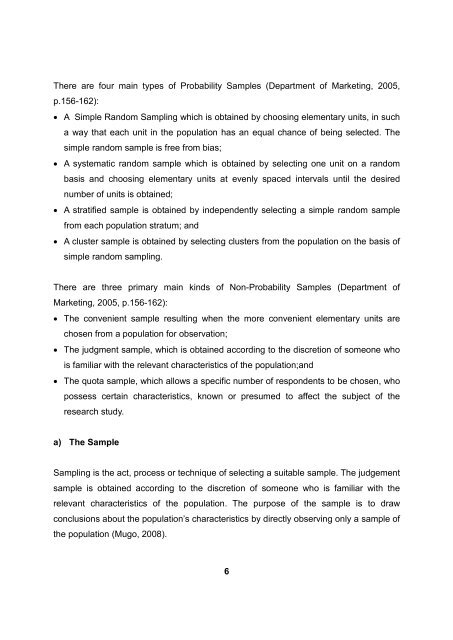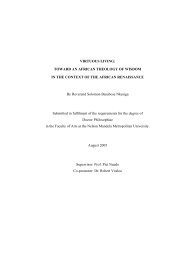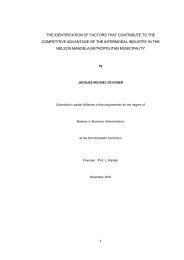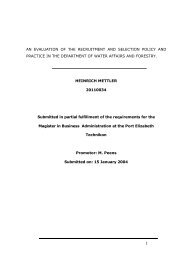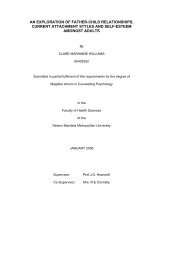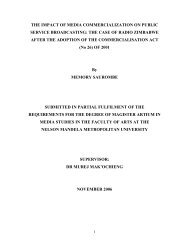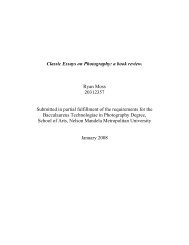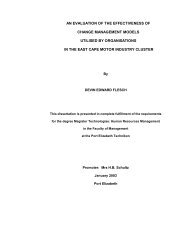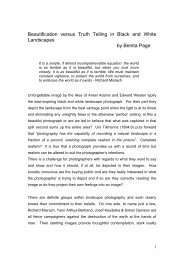- Page 1 and 2: CHAPTER 1SCOPE OF THE STUDY1.1 INTR
- Page 3 and 4: 1.3 RESEARCH OBJECTIVESThe primary
- Page 5: ) Qualitative Research“Qualitativ
- Page 9 and 10: • Living Standards Measure: It di
- Page 11 and 12: 2.2 INDUSTRY ANALYSIS2.2.1 Ethnic c
- Page 13 and 14: grow in the forecast period. Men’
- Page 15 and 16: cleans conditions and detangles whi
- Page 17 and 18: In the general market, products are
- Page 19 and 20: “all natural” claims by special
- Page 21 and 22: As a segment, this market sector ha
- Page 23 and 24: launching new Ethnic facial product
- Page 25 and 26: h) Skin Care products current and f
- Page 27 and 28: organic market, but are also breaki
- Page 29 and 30: (2000) asserts that Ethnic women no
- Page 31 and 32: experience time and time again. Pre
- Page 33 and 34: the government. The emerging black
- Page 35 and 36: Deodorant body sprays are particula
- Page 37 and 38: Euromonitor International One (2007
- Page 39 and 40: way, making it difficult to compete
- Page 41 and 42: and 2.14). As South African men bec
- Page 43 and 44: sales through those outlets is expe
- Page 45 and 46: Producers of mainstream skin care b
- Page 47 and 48: k) Sun Care Products current and fu
- Page 49 and 50: Trends and insights into South Afri
- Page 51 and 52: 2007:38). This expansion of distrib
- Page 53 and 54: CHAPTER 3STRATEGY FOR BUSINESS GROW
- Page 55 and 56: d) Improved SynergyImproved linkage
- Page 57 and 58:
The market penetration strategy is
- Page 59 and 60:
) Gaining competitors' customers (P
- Page 61 and 62:
power saw and a lady in a clown sui
- Page 63 and 64:
Hoskisson and Hitt (2009:183) expla
- Page 65 and 66:
Vertical integration is also claime
- Page 67 and 68:
) InternationalisationAnsoff (1965)
- Page 69 and 70:
are described as non-equity based a
- Page 71 and 72:
Another common reason for operating
- Page 73 and 74:
In recent years however, companies
- Page 75 and 76:
isk than simply attempting to incre
- Page 77 and 78:
Further advantages of diversificati
- Page 79 and 80:
efficiency. Quantity discounts thro
- Page 81 and 82:
CHAPTER 4FRANCHISING AS A GROWTH ST
- Page 83 and 84:
Franchising is a commercial relatio
- Page 85 and 86:
usually grants further licenses wit
- Page 87 and 88:
Miranda (2009) further explains tha
- Page 89 and 90:
The franchisee is said to carry a h
- Page 91 and 92:
e) Competitiveness achieved through
- Page 93 and 94:
franchise, and pay royalties on tim
- Page 95 and 96:
of the franchise is what breeds pos
- Page 97 and 98:
4.6 CONCLUSIONIn this chapter franc
- Page 99 and 100:
onset, which factors may cause cert
- Page 101 and 102:
5.3.1 ValidityIn its purest sense,
- Page 103 and 104:
Speciality Top End, Ethnic Cosmetic
- Page 105 and 106:
5.4.2 Ethical AspectsWritten inform
- Page 107 and 108:
Section three, deals with benchmark
- Page 109 and 110:
Currently Mr Munroe is still occupy
- Page 111 and 112:
) Are current retailers situated in
- Page 113 and 114:
e) Because of this move, is their s
- Page 115 and 116:
concludes however that that there a
- Page 117 and 118:
(2009) states that SA retailers are
- Page 119 and 120:
Carter and Carter (2009) proclaim t
- Page 121 and 122:
6.3.5 Product RangingSection Five o
- Page 123 and 124:
According to The Free Library (2009
- Page 125 and 126:
The literature review reveals that
- Page 127 and 128:
BabyCarter and Carter (2009) explai
- Page 129 and 130:
(2009) also feels that such a niche
- Page 131 and 132:
Munroe (2009) also suggests mini LC
- Page 133 and 134:
) Do you see an interest from the f
- Page 135 and 136:
e) What services are the above reta
- Page 137 and 138:
h) Could current top end retailers
- Page 139 and 140:
Carter and Carter (2009) proclaim t
- Page 141 and 142:
A goal of Market Penetration Strate
- Page 143 and 144:
store to aid in the purchaser’s d
- Page 145 and 146:
Carter and Carter (2009) assert tha
- Page 147 and 148:
Carter and Carter (2009) proclaim t
- Page 149 and 150:
The literature review reveals that
- Page 151 and 152:
The Ethnic cosmetic and toiletry ma
- Page 153 and 154:
• Differentiation from competitor
- Page 155 and 156:
In terms of focus shown to the Ethn
- Page 157 and 158:
and brand reassurance, their desire
- Page 159 and 160:
c) Store design and layoutThe layou
- Page 161 and 162:
f) Promotional ActivitiesThe majori
- Page 163 and 164:
From the conclusions drawn, it was
- Page 165 and 166:
Available from:http://perfumesmelli
- Page 167 and 168:
Cosmetics Design. 2005. Black hairc
- Page 169 and 170:
Fortune Manning Lawyers. 2008. Freq
- Page 171 and 172:
LaPolt, E. K. 1997. Ethical dilemma
- Page 173 and 174:
Pearce, L . 2009. How to Take Your
- Page 175 and 176:
Stilwell, J. 2007. Strategies for B
- Page 177 and 178:
APPENDIX AQUESTIONNAIRE1. INDUSTRY
- Page 179 and 180:
4. GAINING MARKET SHARE AS A NEW EN
- Page 181 and 182:
c) How would you suggest a retail s
- Page 183 and 184:
f) Are current SA retailers who sto
- Page 185 and 186:
10. FUTURE OF THE ETHNIC COSMETICS
- Page 187 and 188:
10.Vetiver, woody notes (men and wo
- Page 189 and 190:
Table 2.9: forecast sales (in Milli
- Page 191 and 192:
Table 2.17: Forecast sales (in Mill
- Page 193 and 194:
Table 2.22: Forecast sales of Depil


